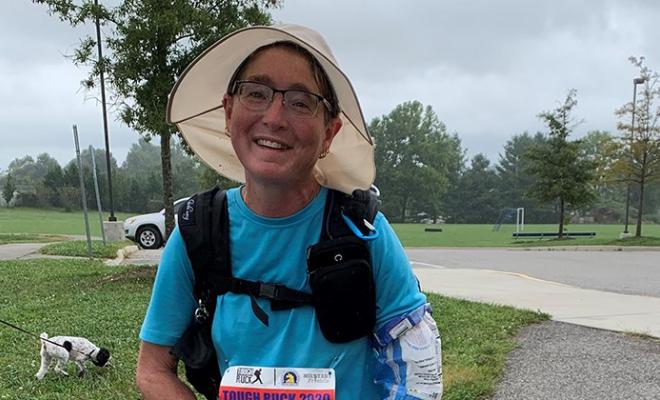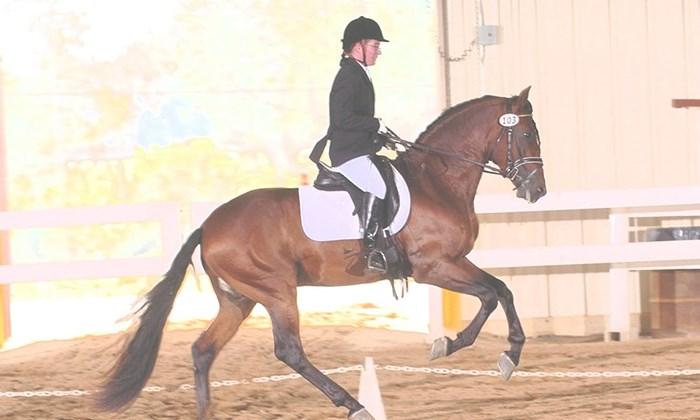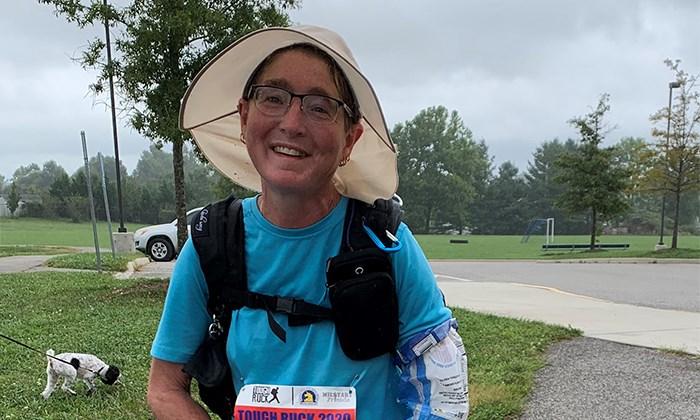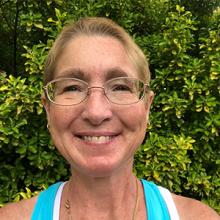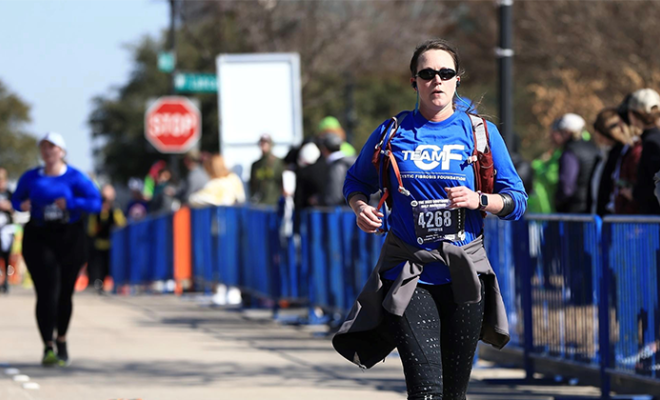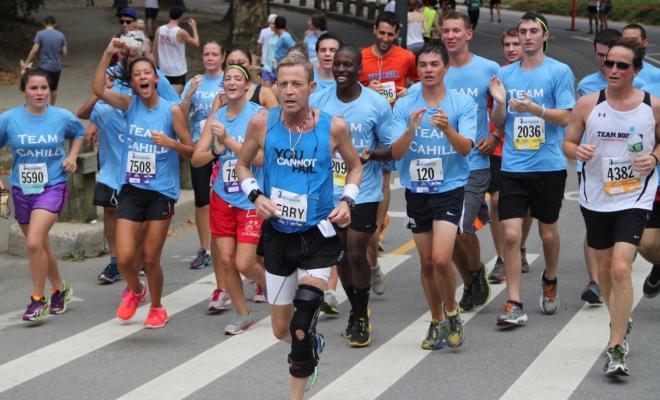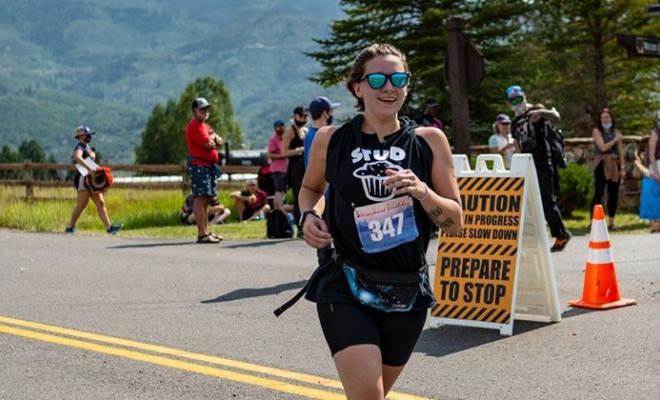Over the 50 years that I've lived with cystic fibrosis, competition has always been a central part of my life. The obsession commenced at an early age when my parents were warned that given the severity of my disease -- I'm a double-delta F508 -- it was imperative that I remain active. As a result, my childhood was filled with impromptu baseball or basketball games, swimming, skiing, tennis, running, and biking. Even though I was the youngest of three siblings, I was expected to keep up. I rose to the challenge and took it one step further -- developing an extremely competitive mentality that has helped safeguard and extend my life.
The acquisition of a mischievous pony when I was 6 launched my equestrian career. I struggled with the disobedient beast for years and our habitual skirmishes instilled a sense of dogged perseverance at a young age. As I matured, I was able to redirect that tenacity toward my true adversary -- cystic fibrosis. In addition to riding daily, I took up distance running. However, I was hindered by my petite stature (39 pounds at age 9), which was indicative of chronic failure-to-thrive and pulmonary disease. I underwent an experimental treatment where I gained 21 pounds in just six weeks -- stimulating a growth spurt and drastically improving my overall health. The following year in a Fourth of July footrace, I not only won my age group but was the first woman as well.
Nevertheless, equestrian pursuits were my true passion and as a pre-teen I began the dangerous discipline of “eventing.” Sports-related injuries and periodic exacerbations interfered with my goals, but my desire to succeed kept driving me forward. By the time I entered high school, I was a successful licensed riding instructor and trainer. Throughout college and graduate school, I continued to ride and compete while pursuing a career in biological research -- but a series of unexpected life-altering events made me reevaluate my priorities. Should I remain in academia or return to my beloved athletic roots?
I resigned from my doctoral program and dove head-first back into the equestrian world. Now that I could devote myself to my passion full-time, I was much happier and experiencing a great deal of competitive success -- including being a new mom. I purchased a lovely young stallion and within a year we made it to the national championships -- achieving a life-long ambition. Shortly afterwards, my husband and I adopted our second daughter and our family was complete.
Despite the many positives, it was becoming painfully evident that cystic fibrosis would not allow me to escape that easily. I had developed a variety of tangential health problems -- ranging from CF-related diabetes to persistent rib fractures from violent coughing -- and my pulmonary function was declining. Within two years, I was no longer capable of training at the high level that fed my soul and watered my spirit.
Reluctantly, I sold my horses and ceased riding -- an activity that had been a vital part of my identity since I was a small child. It was a devastating change.
But being an athlete is a state of mind, and I knew how integral physical activity was to safeguarding my health. With an FEV1 of only 50%, I took up running again and added rock climbing, biking, swimming, and weightlifting to my daily regimen. Poised to compete in a sprint triathlon, I was sidelined by a nasty bout of bronchitis, which dropped my lung function yet again. While reconditioning, an incompatible medication irreversibly plunged my FEV1 to 30%, and I became fettered to oxygen full time. I continued to exercise diligently but competitive sports were now … unrealistic.
One year later I underwent my first double-lung transplant. I attribute my rapid recovery to my athletic background and mentality. Despite combating a myriad of deadly fungal and bacterial infections, I returned to rock climbing, hiking, and tennis after three months. However, there were several additional “bumps in the road” and within 18 months I was diagnosed with fast-moving chronic rejection. While being admitted for treatment, I noticed the ward walking record was 11 miles. Seeing a potential challenge, I woke up the next morning and walked a full marathon in my slippers while trailing an IV pole.
It made me feel alive again, not just to break the record, but to annihilate it. I hadn't realized how much I still yearned to compete and win -- a mindset which made it impossible to quit.
Seven months later I was re-transplanted and my new life commenced. Three months post-surgery, I finished a 36-hour reenactment of the 60-mile Bataan Death March. Although distance running was unfeasible due to the transplant meds, I could still ruck (a jogging pace with a weighted pack). I adapted to my limitations, switched sports, and began to train. Three months later I competed in the Tough Ruck -- a marathon distance carrying a 20-pound pack -- placing extremely well. I also won several other smaller ruck races that season. It was unbelievably gratifying to rediscover my athletic identity. Without it, I had felt untethered.
The good news is that cystic fibrosis no longer directly affects my lungs. That said, the disease has definitely exacted its pound of flesh from my body and soul over the years. Although I have been forced to change my athletic focus and how I view myself, I have always managed to find (or invent) physical ventures that help me develop the mental fortitude necessary for overcoming medical adversity. The desire to compete and win in any venue has driven me further than I ever thought possible -- albeit with a price. Just last month my youngest daughter and I were walking out to the car, and I naturally sped up to reach the vehicle first. She turned to me with a patronizing expression and said, “Mom, not everything is a race!”
I just smiled …
Interested in sharing your story? The CF Community Blog wants to hear from you.

